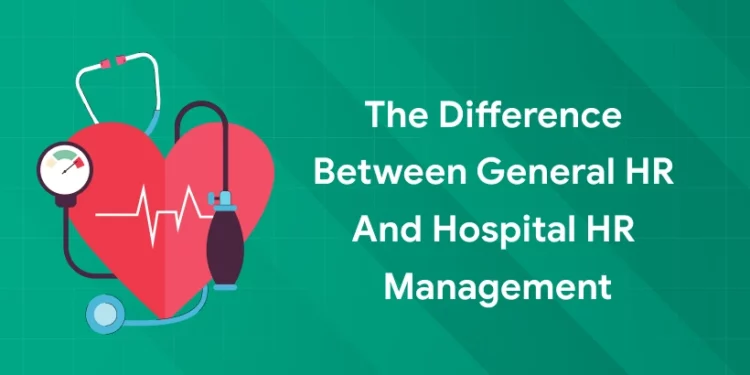Table of Contents
Key Takeaways:
- Hospital HR is more specialized and faces unique challenges compared to general HR.
- Compliance with healthcare regulations is critical in hospital HR.
- Mental health and flexible work arrangements are top priorities in 2025.
- Predictive analytics and AI are transforming hospital HR practices.
- Hospital HR plays a vital role in ensuring quality patient care and staff well-being.
Introduction
Have you ever wondered why HR in a hospital feels so different from HR in a corporate office? If you’ve worked in both, you know the stakes are higher, the hours are longer, and the challenges are more intense. For those outside the healthcare world, hospital HR might seem like just another HR department, but the reality is far more complex. In 2025, with burnout, compliance, and staffing shortages dominating headlines, understanding the difference between general HR and hospital HR is more important than ever.
Whether you’re a student, a professional, or just curious about healthcare careers, this blog will break down the key distinctions, share real-world insights, and help you see why hospital HR is a unique and vital field.
What’s the Difference Between General HR and Hospital HR Management?
1: What is the primary role of a hospital administrator?
General HR focuses on managing employees across industries, handling recruitment, training, compliance, and employee relations.
Hospital HR, on the other hand, specializes in managing healthcare staff, ensuring compliance with strict medical regulations, handling credentialing, and supporting staff in high-stress environments.
Also read: Hospital HR Executive Salary in Kerala
Hospital Administration Course with Assured Career Growth
Hospital Administration Course by Entri App: Master essential healthcare management skills, gain certification, and secure top roles in leading hospitals
Join Now!General HR Management: The Basics
General HR management is the backbone of any organization, ensuring smooth operations and a motivated workforce. Its core responsibilities include:
- Recruitment and Onboarding: Identifying staffing needs, posting job openings, screening candidates, conducting interviews, and managing the onboarding process for new hires.
- Performance Management: Setting performance goals, conducting regular appraisals, providing feedback, and managing disciplinary actions.
- Employee Relations: Resolving workplace conflicts, fostering a positive culture, and ensuring employee engagement.
- Payroll and Benefits Administration: Managing salaries, bonuses, health insurance, retirement plans, and statutory compliance (such as Provident Fund and ESIC).
- Training and Development: Organizing skill development programs, workshops, and certifications to keep employees updated and motivated.
- Compliance: Ensuring adherence to labor laws, workplace safety standards, and company policies.
Hospital HR Management: The Specialized Role
Hospital HR management is a highly specialized field, tailored to the unique demands of healthcare. Its responsibilities go beyond standard HR functions, focusing on the well-being of both staff and patients.
Core Duties and Responsibilities of Hospital HR
| Responsibility | Purpose | Example in Hospitals |
|---|---|---|
| Workforce Planning & Recruitment | Identify staffing needs and hire qualified healthcare professionals | Hiring doctors, nurses, technicians, and support staff; managing credentialing |
| Employee Orientation & Training | Introduce new hires to hospital policies and ongoing skill development | Orientation on HIPAA, patient confidentiality, infection control, and emergency prep |
| Performance Management | Monitor staff performance and facilitate feedback | Appraisals, goal setting, conflict resolution, and disciplinary actions |
| Compensation & Benefits Admin | Manage payroll, benefits, and statutory compliance | Monthly payroll, health insurance, PF, ESIC, and competitive salary packages |
| Employee Engagement & Retention | Reduce turnover and boost morale | Wellness programs, flexible scheduling, recognition awards, and mental health support |
| Compliance with Healthcare Regs | Ensure adherence to healthcare laws and standards | NABH, JCI, HIPAA, OSHA, privacy laws, regular audits, and training |
| HR Information Systems (HRIS) | Streamline HR processes and data analytics | Centralized employee databases, automated leave management, and real-time reporting |
Hospital HR also faces unique challenges such as high turnover, staff burnout, and the need for 24/7 staffing. The role requires a deep understanding of healthcare regulations, medical terminology, and crisis management.
Read in detail: HR Management in Hospitals: Duties and Responsibilities
Key Differences: General HR vs Hospital HR
| Aspect | General HR Management | Hospital HR Management |
|---|---|---|
| Focus | Employee management across industries | Healthcare staff and patient care support |
| Recruitment | Diverse roles, varied skill sets | Specialized medical and support staff |
| Compliance | Labor laws, general regulations | Healthcare-specific laws, JCI/NABH standards |
| Training | General skill development | Continuous medical training, certifications |
| Employee Relations | Conflict resolution, engagement | High-stress environment, crisis management |
| Payroll & Benefits | Standard packages | Specialized medical benefits, shift allowances |
| Workplace Safety | General safety protocols | Infection control, patient safety protocols |
| Legal & Ethical Issues | Standard HR policies | Medical ethics, patient confidentiality |
Also read: Hospital HR Executive Interview Questions and Answers
Hospital Administration Course with Assured Career Growth
Hospital Administration Course by Entri App: Master essential healthcare management skills, gain certification, and secure top roles in leading hospitals
Join Now!Regulatory and Legal Frameworks: General HR vs Hospital HR
The regulatory and legal frameworks governing HR differ significantly between general industries and hospitals. While both must comply with national labor laws, hospital HR faces additional healthcare-specific regulations and standards.
General HR: Key Legal Frameworks in India (2025)
-
Labour Codes:
India’s labor laws have been unified under four new codes:
-
- Code on Wages, 2019
- Industrial Relations Code, 2020
- Code on Social Security, 2020
- Occupational Safety, Health, and Working Conditions Code, 2020
These codes consolidate over 29 previous laws, streamlining compliance and improving worker protections.
-
Essential HR Policies:
- Employment contracts and digital signatures
- Compensation structures and minimum wage
- Leave policies (annual, sick, maternity, paternity)
- Workplace ethics and grievance redressal
- POSH (Prevention of Sexual Harassment) Act compliance.
-
Compliance Requirements:
- Regular audits and record-keeping
- Statutory filings (PF, ESIC, PT)
- Workplace safety and health standards
- Mental health policies for organizations with 100+ employees.
Hospital HR: Additional Legal and Regulatory Frameworks
-
Healthcare-Specific Regulations:
- NABH (National Accreditation Board for Hospitals & Healthcare Providers):
Mandates strict standards for patient safety, staff training, and quality management. - JCI (Joint Commission International):
International accreditation for hospitals, focusing on patient care and safety. - HIPAA (Health Insurance Portability and Accountability Act):
Ensures patient confidentiality and data security. - OSHA (Occupational Safety and Health Administration):
Regulates workplace safety, especially in high-risk environments.
- NABH (National Accreditation Board for Hospitals & Healthcare Providers):
People also read: Human Resource Manager in Hospitals: Specialised Role and Career Path
-
Hospital HR Compliance Requirements:
- Credentialing and licensing of medical staff
- Continuous medical education and certification
- Infection control and patient safety protocols
- Handling sensitive patient data and maintaining confidentiality
- Compliance with state and national healthcare regulations.
Comparison Table: Regulatory Frameworks
| Framework | General HR (2025) | Hospital HR (2025) |
|---|---|---|
| Labour Codes | Wages, Social Security, IR, OSHW | Wages, Social Security, IR, OSHW |
| Workplace Safety | General safety protocols | Infection control, patient safety, emergency protocols |
| Employee Rights | Equal pay, non-discrimination, timely wages | Equal pay, non-discrimination, timely wages |
| Statutory Compliance | PF, ESIC, PT, POSH, mental health policies | PF, ESIC, PT, POSH, mental health policies |
| Healthcare Regulations | Not applicable | NABH, JCI, HIPAA, OSHA, state healthcare laws |
| Data Privacy | General data protection | Strict patient confidentiality and data security |
| Staff Credentialing | Not required | Mandatory for medical staff |
Hospital HR Trends in 2025
- Mental Health Focus: Hospitals are prioritizing employee mental health with wellness programs, counseling, and flexible work options.
- Flexible Work Arrangements: Hybrid schedules and adjustable hours are becoming more common to reduce burnout and improve retention.
- Predictive Analytics: Predictive tools help forecast staffing needs, reduce absenteeism, and optimize resource allocation.
- AI and Automation: AI is transforming hiring, payroll, and benefits processes, but human oversight remains essential for fairness and effectiveness.
Advance Your Career with Entri’s Hospital Administration Course
Ready to take your HR career to the next level? Entri’s Hospital Administration course in Kerala is designed for professionals who want to specialize in healthcare management. The course covers essential topics like hospital operations, healthcare regulations, staff management, and patient care.
- Placement Assistance: Entri offers dedicated placement support to help you secure roles in top hospitals and healthcare organizations.
- Course Highlights:
- In-depth training in hospital administration
- Focus on healthcare regulations and compliance
- Practical insights from industry experts
- Career guidance and placement assistance
Enroll now and start your journey toward a rewarding career in hospital administration: Hospital Administration Course in Kerala.
Conclusion
Understanding the difference between general HR and hospital HR is crucial in today’s dynamic job market. While both roles share common goals, hospital HR stands out with its specialized focus, unique challenges, and critical impact on patient care. Whether you’re considering a career in HR or looking to specialize in healthcare, knowing these distinctions will help you make informed decisions and thrive in your chosen field.
Hospital Administration Course with Assured Career Growth
Hospital Administration Course by Entri App: Master essential healthcare management skills, gain certification, and secure top roles in leading hospitals
Join Now!Frequently Asked Questions
What are the main challenges in hospital HR?
High turnover, burnout, compliance with healthcare regulations, and managing 24/7 staffing are major challenges.
Can HR professionals transition from general HR to hospital HR?
Yes, but additional knowledge of healthcare regulations and medical terminology is required.
What skills are needed for hospital HR?
Healthcare regulations, crisis management, empathy, and advanced communication skills.
How does hospital HR impact patient care?
Well-supported and satisfied staff provide better patient care, leading to improved outcomes.
What are the latest trends in hospital HR?
Mental health support, flexible work arrangements, predictive analytics, and AI-driven HR platforms.















